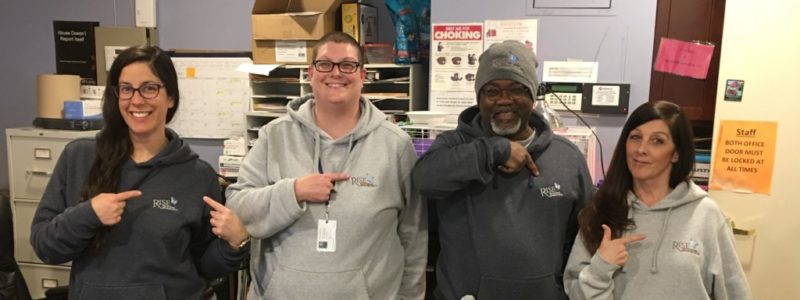Having made it through the first two years of the COVID-19 pandemic nearly COVID-free, RISE Community Residence (CR ) Staff was prepared to enter 2022 with a sense of victory over the virus that has derailed life as we know it across the USA – and the world. Unfortunately, when the new and highly transmissible omicron variant hit our community near the end of December and into January, even our stringent prevention measures were unable to keep infections at bay. The four RISE CRs were hit particularly hard by the spike in community spread.
“Working through the pandemic has showed staff what they are made of. They continued to push through every day, and they realized their own capabilities to continue to work in this field.”
At Hedgerow House, both the program director and the program supervisor contracted COVID, and were unable to work for an extended period of time. Simultaneously, the majority of residents at Edgewood House and Milestone Manor tested positive. And at Rain House, while only one of the residents tested positive, everyone else was required to follow COVID protocols and quarantine for five days. Program directors, supervisors and staff reacted quickly to ensure effective management of the CRs during the mandatory quarantine periods, while keeping everyone as safe and healthy as possible. As individuals who reside in RISE CRs live with mental health and substance use challenges, these plans also included ways to bolsters spirits, manage anxiety, and to protect everyone’s overall mental wellbeing.

Both Julianne Thomas, Hedgerow House Program Director, and Nicole Smarro, Program Supervisor came down with COVID around Christmas time. Despite being vaccinated, they both experienced significant symptoms. In addition to COVID, Nicole also developed bronchitis and pneumonia. “We both were ill, which made it difficult to even be available to help run the program by phone or video chat,” says Nicole. “But Dennis Brooks, our Senior Counselor, stepped up and ran the show. He took on all administrative duties. He and two other staff worked double shifts to ensure that 24-hour coverage was maintained at the house.”
Julianne adds, “Our wonderful staff all pulled together and did what they needed to do. The team at Hedgerow House has been together for a while and works as a cohesive unit. Throughout the pandemic they were able to adapt, and went above and beyond to keep things running smoothly despite the unending challenges presented.” For example, early in 2020, Ralph Bell, the overnight staff person had COVID and was very ill. Michael Gaillard, the weekend staff person, covered Ralph’s Sunday through Thursday overnights and the rest of staff worked many overtime hours to cover his weekend shifts.

At Milestone Manor, five of the eight residents tested positive for COVID. Thankfully, most showed no symptoms and the ones who did, only had mild flu-like symptoms. “We had to develop a plan to keep everyone safe, figure out how to maintain 24-hour staff coverage while minimizing staff exposure, and be creative in how to run things,” Program Director, Dawn Daum, explains. “This was especially challenging as we were short staffed, with two of our full-time staff out sick with COVID. There was so much to figure out – separating the positive individuals from those who tested negative, utilizing Personal Protective Equipment (PPE) to deliver meals and manage medication administration, and continuing to provide the restorative services that help our residents work on their goals.”
Communication was key. Staff checked in on the residents throughout the day either in person or by calling or texting their cell phone. Staff revamped the menu to provide meals that were easily delivered to the residents in their rooms. A system for medication management was devised. And a shower schedule was set up. “The residents who had tested negative were very helpful and did what they could to make things run smoother like help prepare meals,” Dawn shares. “Once we got things rolling it went relatively smoothly and we were able to make sure everyone’s needs were met.”

At Edgewood house, where there had not been cause for quarantine since the pandemic began, ten of the eleven residents tested positive for COVID. As with Milestone, most had either mild symptoms or none. Only one older resident experienced more severe symptoms. Program Director, Ian Vonie, quickly developed a plan of action that best suited the needs of the individuals residing at Rain House. The plan included limiting the number of staff coming to the house to minimize exposure – resulting in Ian and two other staff members working 24-hour shifts, and isolating themselves in their own homes when resting in-between.
“One thing that was drastically different than the way we normally run things was that we set up a ‘command center’ in the dining room where we were readily available to meet everyone’s needs,” Ian says. “We gave out water bottles to keep everyone hydrated, delivered meals on paper plates with disposable utensils to their rooms, and brought the garbage can around to the rooms afterword to reduce the number of things passed between staff and the residents.”
Resident morale and mental wellbeing were of major concern.
Resident morale and mental wellbeing were of major concern. Staff encouraged the use of coping skills and facilitated participation in virtual groups and one-on-one virtual appointments. “One of the first things we did was call service providers to set up virtual appointments, obtain login information for groups and brought laptops up to the rooms,” Dawn says. Staff also offered arts and crafts materials, adult coloring books, and made sure that everyone had chargers for their electronics so they could entertain themselves by watching movies, listening to music, etc. “We brought them coffee, cold drinks, treats, extra snacks throughout the day,” Ian explained. “In the mornings, we brought around a breakfast cart to give them choices of things to eat. Staff went around every hour to touch base. Often, they just wanted to chit chat, talk about what they were watching on their phones. It helped them just to have everyday conversations.”

Morale was a concern at Rain House as well. “Although only one individual tested positive and had to be quarantined to her bedroom, the rest of the residents were asked to quarantine in the house,” Jackie Knowles, Program Director explains. “It was difficult,” she continued. “They didn’t understand the ramifications and were uncooperative. It was a constant struggle having to remind residents why they needed to quarantine. Staff used PPE to deliver meals and medication to the resident in quarantine. The client also given her own bathroom, which caused further consternation as the remainder of residents had to share one shower on the other side of the house. Luckily no staff had symptoms. All were informed of the situation, and although they had questions regarding risks of exposure, they all came in to cover their shifts.”
Protocols that were developed in 2020 continued to be used in the Community Residences throughout the pandemic.
“I can’t imagine how we would have managed having so many individuals testing positive at once back when the pandemic first started,” Dawn exclaims. “There was so much fear surrounding the unknowns about COVID. Vaccines were not available yet, the symptoms of those who had COVID were so severe, and the quarantine period was much longer.” In 2020, everyone at both Milestone Manor and Rain House had to quarantine due to possible COVID exposures. “Thankfully, since no one tested positive for COVID, the residents did not have to isolate in their bedrooms,” she continues. Because there was so much uncertainty surrounding COVID, the staffing was restricted to only two staff members at both CRs, trading off 24-hour shifts, and following Department of Health (DOH) guidelines, quarantined in their own homes when off-shift. The remaining staff at both CRs worked remotely, providing restorative services to assist the residents to work on their goals via telehealth.
“We discovered that we could continue to provide restorative services to the individuals in the CRs remotely,” Dawn shares. “We have continued to hold our staff meetings via video chat. We find that it is highly effective without requiring staff who are not scheduled to work a shift at the CR to come in.” Other protocols that were developed and continue to be used in the CRs are the use of face masks and other PPE by all staff, cleaning and sanitizing commonly used surfaces three times per day and developing in-house programing. “At the time, I had been thinking about developing in-house programs,” explains Dawn, “so when all the community agencies shut down, we began providing groups and meetings in the house. Even after the community agencies began offering virtual and eventually in-person groups, we continued providing in-house programs because they proved to be so successful.”
In-person service restrictions impeded the accessibility of traditional, effective mental health and substance use services.
At Hedgerow House, providing care for residents struggling with the challenges of early recovery has proved especially challenging throughout the pandemic. “Residents, who usually had 15 hours of intensive outpatient treatment, were reduced to one telehealth hour per week,” Julianne explains. Rather than being in their groups, the residents were all present at the CR all day, especially when they had to quarantine due to possible COVID exposures. Staff had to come up with activities to engage them in recovery. Nicole adds, “Not only were we not able to connect people with community services to aid in their recovery, but in-person service restrictions impeded the accessibility of traditional, effective mental health and domestic violence services – which was needed to work on the underlying issues driving their addictions.”

“Thankfully, our community partners continued to reach out to Hedgerow House and provided much needed help,” Juliane says. “Healing Springs Community and Outreach Center staff are extraordinary to help keep people motivated. Ben Deeb, the Certified Recovery Peer Advocate (CRPA) supervisor, came to Hedgerow House and held AA meetings in the outside gazebo during the spring and summer in both 2020 and 2021. Randy Marshall, another CRPA, continues to come every Monday to develop wellness plans, hold individual discussions, and run groups. Pine Grove Community Church was a huge asset. Ben’s mom, Nancy Deeb, transported people to church and even paid out of pocket to take them to brunch to help them socialize and Pastor Mark brought us food. Jessy Thompson, from Shelters of Saratoga (SOS) checks in on us on a weekly basis to see if we need anything, and shares donations with Hedgerow House pretty regularly – including food and supplies such as toilet paper, socks, towels, sheets, etc.”
“The COVID Pandemic brought out the values of those who call themselves essential workers.”
Managing the CRs and keeping everyone safe through the pandemic was emotionally trying and came at a personal cost for many staff members. Yet, despite this, RISE CR staff remain passionate about helping the individuals they serve meet their mental health and recovery goals. The support our staff members have shown each other is admirable. Many volunteered to work relief in other CRs – including Jackie Knowles, who worked countless overnights at Edgewood house in 2021.
Julianne says, “working through the pandemic has showed staff what they are made of. They continued to push through every day, and they realized their own capabilities to continue to work in this field.” “It brought out the values of those who call themselves essential workers,” Ian adds.
RISE administration remains in awe and gratitude of staff and leadership at all our CRs for their dedication, compassion, and willingness to put themselves as risk to continue to provide quality services to the individuals in our programs.
